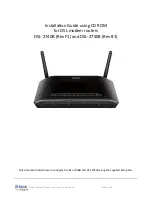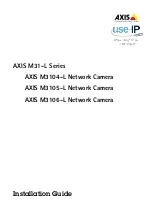
Compliance —
FCC Part 15 Class A,
IC Class/classe A
Standards —
LAN: IEEE 802.3 Ethernet v. 2;
E1: ITU-T G.703, G.704, G.706,
G.732
Interfaces —
Control: EIA/TIA RS-232
proprietarily pinned on RJ-45;
LAN:
-UBE1 model only: 10BASE2;
All other models: 10BASE-T;
LINK:
-UE1, -UBE1, and -2UE1
models only: E1;
-UT1 and -UT1S models only:
T1;
-U35 and -2U35 models only:
ITU-T V.35;
-U21 and -2U21 models only:
EIA/TIA RS-530 patched to
ITU-T X.21
Protocols —
On LINK interface:
Synchronous PPP, Frame Relay
(RFC 1490), HDLC
Data Format —
Control interface: 8 data bits, no
parity, 1 stop bit (fixed);
E1:
Framing: D4 or ESF;
Line coding: AMI;
Zero suppression:
Transparent, B7ZS, B8ZS;
T1:
Framing: 256N (no MF, CCS)
with or without CRC-4, 256S
(TS16 MF, CAS) with or
without CRC-4;
Line Coding: AMI;
Zero suppression: HDB3
E1 Line —
Impedance: 120 ohms (balanced)
or 75 ohms (unbalanced);
E1 Line (continued)—
Signal Levels:
Receive: 0 to –30 dB with LTU,
0 to –12 dB without LTU;
Transmit: 2.7 to 3.3 volts
balanced or 2.133 to
2.607 volts unbalanced;
Jitter Performance: As per ITU-T
G.823
T1 Line —
Impedance: 100 ohms
(balanced);
Signal Levels:
Receive: 0 to –36 dB with CSU,
0 to –10 dB without CSU;
Transmit: 0, –7.5, –15, –22.5 dB
with CSU, user-adjustable
at up to 655 ft. (200 m)
without CSU;
Jitter Performance: As per AT&T
Pub. TR-62411
Data Rate —
Control interface:
9600 bps (fixed);
E1: 2.048 Mbps;
T1: 1.544 Mbps
User Controls —
On-screen menus;
(1) Rear-mounted rocker switch
for power
Indicators —
All front-mounted LEDs;
All models:
(1) POWER,
(1) READY,
(2) LINK1:
(1) DATA (activity),
(1) ERR (error);
(2) LINK2:
(1) DATA (activity),
(1) ERR (error);
-UE1, -UBE1, -UT1, -UT1S, -U35,
and -U21 models only:
(2) LAN:
(1) DATA (activity),
(1) ERR (error);
Indicators (continued)—
-2UE1, -2U35, and -2U21
models only:
(2) LAN1:
(1) DATA (activity),
(1) ERR (error);
(2) LAN2:
(1) DATA (activity),
(1) ERR (error);
-UE1, -UBE1 models only:
(2) SYNC LOSS:
(1) LOC (local),
(1) REM (remote);
-2UE1 model only:
(4) SYNC LOSS:
(2) LINK1 (main channel):
(1) LOC (local),
(1) REM (remote);
(2) SUB (subchannel):
(1) LOC (local),
(1) REM (remote);
-UT1 model only:
(2) ALARM:
(1) RED, (1) YEL (yellow);
-UT1S model only:
(4) ALARM:
(2) LINK1 (main channel):
(1) RED, (1) YEL (yellow);
(2) SUB (subchannel):
(1) RED, (1) YEL (yellow)
Connectors —
(1) Front-mounted RJ-45
control port;
All others rear-mounted;
All models: (1) IEC 320 male
power inlet;
-UE1, -UT1, -UT1S, -U35, and -U21
models only:
(1) RJ-45 female 10BASE-T
port,
-UBE1 model only:
(1) BNC female 10BASE2 port,
-2UE1, -2U35, and -2U21
models only:
(2) RJ-45 female 10BASE-T
ports,
Connectors (continued) —
-UE1 and -UBE1 models only:
(1) RJ-48C female balanced
E1 port,
(2) BNC female unbalanced
alternative E1 port:
(1) TX, (1) RX;
-2UE1 models only:
(2) RJ-48C female E1 ports:
(1) main channel,
(1) subchannel;
(4) BNC female unbalanced
alternative E1 ports:
(2) main chnl.: (1) TX, (1) RX;
(2) subchnl.: (1) TX, (1) RX;
-UT1 model only:
(1) RJ-48C female T1 port;
-UT1S model only:
(2) RJ-48C female T1 ports:
(1) main channel,
(1) subchannel;
-U35 and -2U35 models only:
(1) M/34 female V.35 port;
-U21 and -2U21 models only:
(1) DB25 female RS-530 port
patched to (1) DB15 female
X.21 port
Power —
Input: 100 to 230 VAC, 50 or 60 Hz;
Consumption: Up to 10 VA
Temperature Tolerance —
32 to 122°F (0 to 50°C)
Humidity Tolerance —
Up to 90% noncondensing
Size —
1.8" (1U) H x 8.5"W x 9.6"D
(4.4 x 21.6 x 24 cm)
Weight —
2.5 lb. (1.2 kg)
Internet Access Router 2
LAN
Phone
System
E1 or T1
Sublink
E1 or T1
Main Link
E1 or T1
to PSTN
E1 or T1
E1 or T1
Service
Voice-Phone
Network
Internet
PABX
Specifications
The IAR 2 is more than just another remote-access device—it’s flexible enough to
handle all kinds of business communication.




















